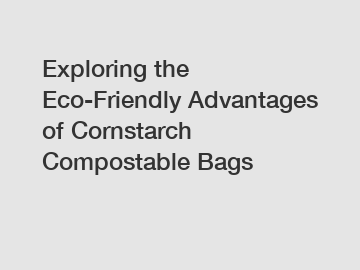Exploring the Eco-Friendly Advantages of Cornstarch Compostable Bags
Exploring the Eco-Friendly Advantages of Cornstarch Compostable Bags.
Cornstarch compostable bags have gained significant attention in recent years due to their eco-friendly properties. These bags, made from cornstarch-based materials, offer numerous advantages over traditional plastic bags. In this article, we will delve into the origins of these bags, discuss the process through which they are made, and highlight their environmental significance and potential impact.
The idea behind cornstarch compostable bags stems from the need to find sustainable alternatives to single-use plastic bags that often end up in landfills and contribute to environmental pollution. With the increasing concern over plastic waste and its detrimental effects on ecosystems, scientists and manufacturers began exploring various biodegradable materials.

Cornstarch, derived from corn kernels, emerged as a viable option due to its abundance and renewability. To create cornstarch compostable bags, the cornstarch is first extracted from the kernels and then processed into a bioplastic material called polylactic acid (PLA). This material can be molded into flexible and durable bags, similar to traditional plastic bags. However, unlike plastic bags, cornstarch compostable bags are completely biodegradable and break down into harmless organic matter within a few months under the right conditions.
The composting process of cornstarch compostable bags involves exposing them to the right combination of heat, moisture, and microbial activity. When composted in industrial facilities or home composting systems, these bags decompose efficiently, releasing valuable nutrients into the soil. This natural degradation significantly reduces the environmental impact compared to plastic bags, which take hundreds of years to decompose, if at all.
The eco-friendly advantages of cornstarch compostable bags are twofold. Firstly, their production is less resource-intensive than traditional plastic bags. Corn is a renewable resource that can be grown year after year, unlike the fossil fuels used to produce plastic. Additionally, the manufacturing process of cornstarch-based materials generates fewer greenhouse gas emissions compared to plastic production. This aspect contributes to reducing the carbon footprint associated with single-use bags.
Secondly, the biodegradability of cornstarch compostable bags addresses the pollution issue caused by plastic waste. With their ability to break down into organic matter, these bags do not persist in the environment, reducing the risk of harming wildlife or clogging waterways. Furthermore, when properly composted, the resulting organic matter can enrich soil quality, fostering healthier plant growth and supporting sustainable agriculture.
The rise of cornstarch compostable bags has triggered a positive shift towards more sustainable consumer choices. Individuals and businesses are gradually opting for these eco-friendly alternatives, leading to a reduction in plastic bag usage. While the initial cost of cornstarch compostable bags may be slightly higher, their long-term environmental benefits outweigh the upfront investment.
In conclusion, cornstarch compostable bags offer a compelling solution to the environmental problems resulting from plastic bag usage. Their origins in renewable resources, biodegradability, and lower carbon footprint make them a sustainable alternative. By choosing these bags, consumers can actively contribute to reducing plastic waste and protecting the planet's delicate ecosystems. Taking small steps, such as using cornstarch compostable bags, can collectively have a significant positive impact on the environment.
Want more information on biodegradable resin suppliers, what is pbat, biodegradable resin manufacturers? Feel free to contact us.
227
0
0


Comments
All Comments (0)